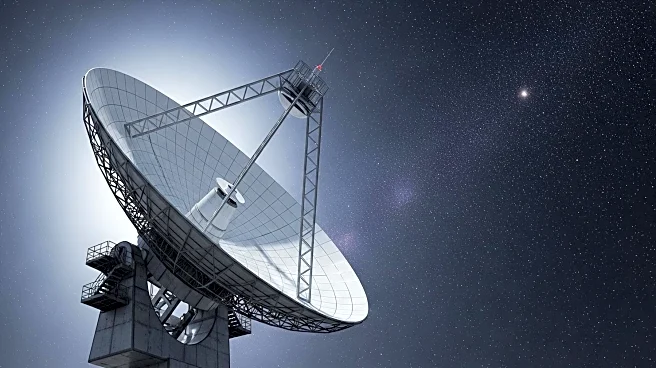What is the story about?
What's Happening?
Alfred Charles Bernard Lovell, born on August 31, 1913, was a pivotal figure in the field of radio astronomy. After completing his PhD in physics in 1936, Lovell utilized surplus radar equipment post-World War II to establish a radio astronomy observatory at Jodrell Bank in 1945. Despite initial challenges, he oversaw the construction of the 76-meter Mark 1 radio telescope, completed in 1957. This telescope gained international prominence by tracking Sputnik 1, marking a significant achievement in the field. Lovell served as the director of Jodrell Bank until 1981, and the observatory's main telescope was renamed the Lovell Telescope in 1987 in his honor.
Why It's Important?
Lovell's work at Jodrell Bank Observatory was crucial in advancing radio astronomy, a field that has significantly contributed to our understanding of the universe. The Mark 1 radio telescope's ability to track Sputnik 1 demonstrated the potential of radio telescopes in space exploration and defense, particularly during the Cold War. Lovell's contributions laid the groundwork for future developments in radio astronomy, influencing both scientific research and technological advancements. His legacy continues to impact the field, as the Lovell Telescope remains a vital tool for astronomers worldwide.
What's Next?
The continued use and development of radio telescopes like the Lovell Telescope are expected to further enhance our understanding of cosmic phenomena. As technology advances, these instruments will likely play a key role in new discoveries and innovations in astronomy. The observatory's ongoing research and collaborations may lead to breakthroughs in understanding the universe's origins and behavior, maintaining Lovell's legacy in the scientific community.
Beyond the Headlines
Lovell's work highlights the intersection of scientific innovation and geopolitical contexts, particularly during the Cold War. The ability to track long-range missiles and satellites underscored the strategic importance of radio astronomy in national defense. Additionally, Lovell's efforts in overcoming public pushback and financial challenges during the construction of the Mark 1 telescope reflect the broader societal implications of scientific endeavors.
















